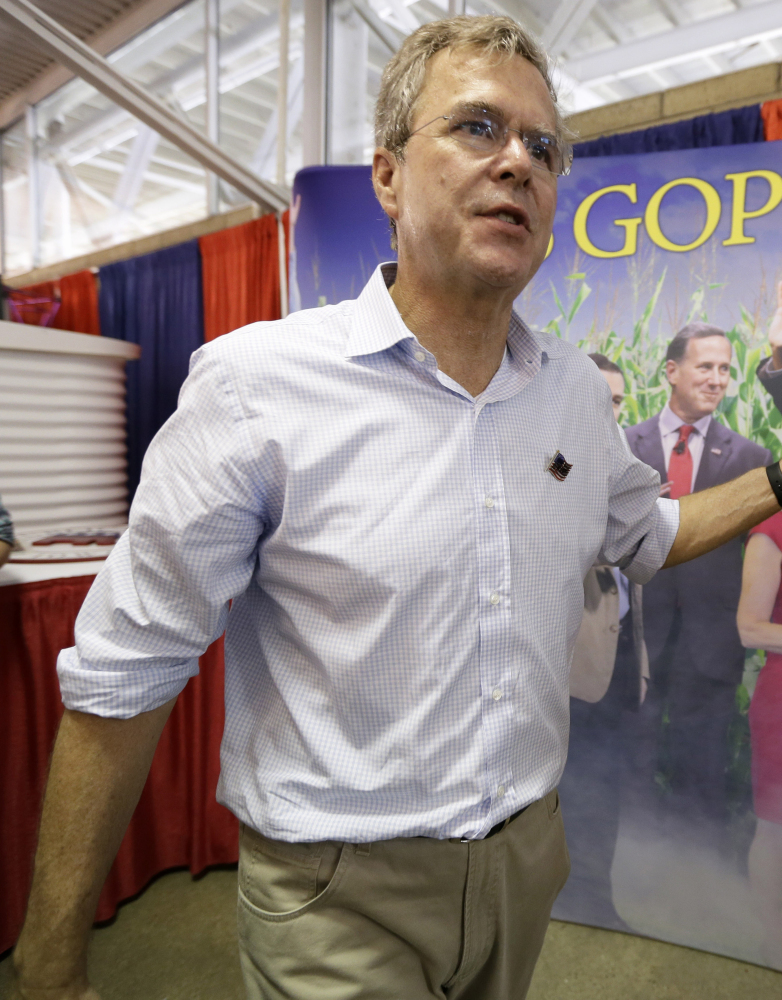DES MOINES — When Jeb Bush stepped up onto the fabled soapbox at the Iowa State Fair on Friday, fairgoers pelted him with questions about the legacy of his brother, a former president. And his father, another former president. And one of his foreign policy advisers, Paul Wolfowitz, the architect of his brother’s war in Iraq. And about the war itself.
Under a blazing sun, Bush expressed irritation with what he called “the parlor game” of focusing on Wolfowitz and other past Bush administration advisers who have resurfaced for this Bush campaign.
“If I’m president, we will have a strategy on day one to take out this grave threat to our national security and to the world,” he said. “I promise you that.”
This was supposed to be the week when Bush would finally lay out his own thoughts on how to combat the Islamic State terror group and put Hillary Rodham Clinton on the defensive – and wrest himself away from his family legacy in the process. But over several days, it has become evident that his ideas on the subject are remarkably similar to George W. Bush’s ideas and that he firmly believes Democrats – not his brother – now deserve the blame for the unrest in Iraq and neighboring Syria.
His new struggles with the issue also come as he is fading in polls and being drowned out by the angry outsiders dominating the race.
According to Bush this week, the removal of Saddam Hussein from power “turned out to be a pretty good deal.” The 2007 troop surge was “an extraordinarily effective” strategy. By the time his brother left office, he said, the “mission was accomplished” in Iraq because security had been restored.
Bush also said he won’t rule out waterboarding in the interrogation of terrorism suspects, although he added, “I do think in general that torture is not appropriate.”
Bush faults President Obama for his unwillingness to talk directly about “radical Islamic terrorists” and Clinton for visiting Iraq only once as secretary of state. He said it might be necessary to deploy more U.S. forces to both Iraq and Syria – and that troops already on the ground should be embedded more closely with local forces.
As for questions about advisers, Bush told fairgoers Friday that he has a young team working at his campaign headquarters in Miami. Shrugging his shoulders, Bush said any veteran Republican foreign policy advisers “had to deal with two Republican administrations” run by his brother and father.
“I mean, this is kind of a tough game to be playing, to be honest with you,” he said. “I’m my own person.”
In an interview Friday, radio host Hugh Hewitt asked Bush whether it’s easier or harder for him to talk about national security given his last name. Bush shot back: “It doesn’t matter. I’m the first candidate to have a view on this with enough detail for people to see what the world would look like if I’m president.”
But Democrats are relishing the chance to take Bush’s remarks this week and remind voters of his family ties. During a town hall in Dubuque, Iowa, on Friday, Clinton took aim at Bush’s criticism of her, noting that his brother signed an agreement as president to withdraw combat troops from the country by 2011.
“I do think that it’s a little bit surprising to hear Jeb Bush talk about this,” she said. “He expects the American people to have a collective case of amnesia.”
Later in the town hall, Clinton sought to single out Jeb Bush’s comments on women’s issues, but mistakenly referred to him as “George Bush.”
“I get confused,” she said, seeming to relish her own error. “Oh, well.”
Most Americans still believe the Iraq war was a mistake and are opposed to new military engagement – making Jeb Bush’s approach to national security risky. But polling suggests that his positions are popular among most Republicans, especially if it means raising doubts about Clinton’s tenure as secretary of state.
Among his GOP rivals, Sen. Rand Paul, R-Ky., has said that “it was a mistake to topple” Hussein, while New Jersey Gov. Chris Christie says it “makes no sense for us to be re-litigating yesterday.”
Businessman Donald Trump has it both ways, blaming George W. Bush for invading the country in the first place and Obama for pulling troops out in 2011. “The war should have never happened,” he told Fox News earlier this year. “Once it did happen, you should have left the troops in. It’s really a double fault.”
Copy the Story LinkSend questions/comments to the editors.



Success. Please wait for the page to reload. If the page does not reload within 5 seconds, please refresh the page.
Enter your email and password to access comments.
Hi, to comment on stories you must . This profile is in addition to your subscription and website login.
Already have a commenting profile? .
Invalid username/password.
Please check your email to confirm and complete your registration.
Only subscribers are eligible to post comments. Please subscribe or login first for digital access. Here’s why.
Use the form below to reset your password. When you've submitted your account email, we will send an email with a reset code.